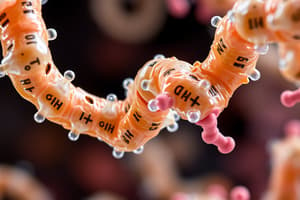Podcast
Questions and Answers
What is the role of enzymes in biochemical reactions?
What is the role of enzymes in biochemical reactions?
- They speed up reactions without being changed themselves. (correct)
- They change the equilibrium of the reaction.
- They are consumed during the reaction.
- They increase the activation energy required for reactions.
Under what conditions do enzymes typically lose their effectiveness?
Under what conditions do enzymes typically lose their effectiveness?
- By interacting with substrates.
- When mixed with other proteins.
- At optimal temperature and pH.
- When subjected to extreme temperatures or pH levels. (correct)
How does the 'lock and key' hypothesis explain enzyme specificity?
How does the 'lock and key' hypothesis explain enzyme specificity?
- Only specific substrates can fit into the active site of the enzyme. (correct)
- The active site of the enzyme is identical for all types of reactions.
- Enzymes can catalyze reaction for multiple substrates.
- The enzyme changes shape to fit any substrate.
What defines the optimum temperature for an enzyme?
What defines the optimum temperature for an enzyme?
Which characteristic is NOT true of enzymes?
Which characteristic is NOT true of enzymes?
What role does pH play in enzyme activity?
What role does pH play in enzyme activity?
What happens to enzymes at high temperatures?
What happens to enzymes at high temperatures?
Which of the following describes catabolic enzyme-catalyzed reactions?
Which of the following describes catabolic enzyme-catalyzed reactions?
What does the 'lock-and-key' hypothesis illustrate about enzymes?
What does the 'lock-and-key' hypothesis illustrate about enzymes?
At what temperature do most human enzymes have an optimal catalytic activity?
At what temperature do most human enzymes have an optimal catalytic activity?
Which factor can disrupt ionic bonds within an enzyme, potentially affecting its activity?
Which factor can disrupt ionic bonds within an enzyme, potentially affecting its activity?
What happens to the rate of an enzyme-catalyzed reaction when the substrate concentration is increased to saturation?
What happens to the rate of an enzyme-catalyzed reaction when the substrate concentration is increased to saturation?
Which enzyme is specifically used in the production of smoother ice cream?
Which enzyme is specifically used in the production of smoother ice cream?
Which of the following enzymes is used as a meat tenderizer?
Which of the following enzymes is used as a meat tenderizer?
Why might an enzyme not function well outside its optimal pH range?
Why might an enzyme not function well outside its optimal pH range?
Which enzyme is involved in breaking down cellulose in cereals?
Which enzyme is involved in breaking down cellulose in cereals?
Study Notes
Definition of Enzymes
- Enzymes are proteins that accelerate biochemical reactions without being consumed in the process.
- They function by forming an enzyme-substrate complex, leading to the production of specific end products.
Characteristics of Enzymes
- Enzymes are sensitive to environmental factors like temperature and pH; they require optimal conditions for efficiency.
- They remain unchanged after catalysis, allowing them to act on multiple substrate molecules over time.
- Highly specific in function, with active sites designed for particular substrate shapes, likened to a "lock-and-key" mechanism.
Lock and Key Hypothesis
- The "lock and key" hypothesis illustrates that each enzyme (lock) binds only to its specific substrate (key).
- This specificity ensures efficient biochemical reactions tailored to particular substrates.
Factors Affecting Enzyme Activity
-
Temperature:
- Each enzyme has an optimum temperature, usually around 37°C in humans, where it catalyzes reactions at maximum rates.
- High temperatures can lead to denaturation, inactivating the enzyme.
-
pH:
- Enzyme activity is influenced by the acidity or alkalinity of its environment; each enzyme has an optimum pH.
- Deviations from this pH can disrupt ionic and hydrogen bonds, altering the enzyme's structure and function.
-
Substrate Concentration:
- Increasing substrate concentration initially raises the reaction rate, up to a saturation point where all active sites are occupied.
- Beyond saturation, increases in substrate have no effect on reaction rate.
Optimum Conditions
- Optimum Temperature: Temperature at which an enzyme functions best, usually correlating with the organism's normal body temperature.
- Optimum pH: Specific pH level that allows an enzyme to reach its peak activity; varies between different enzymes.
Commercial Applications of Enzymes
- Utilized in various industries:
- Protease for meat tenderizers.
- Lactase to reduce lactose in ice cream, preventing gritty texture.
- Cellulase in cereal production and agar extraction from seaweed.
Types of Reactions
- Anabolic Reactions: Enzyme-catalyzed processes that build complex molecules from simpler ones, requiring energy input.
- Catabolic Reactions: Enzyme-catalyzed processes that break down complex molecules into simpler ones, releasing energy.
Enzyme Inhibitors
- Molecules that impede enzyme activity by binding to the enzyme and affecting its ability to catalyze reactions.
Studying That Suits You
Use AI to generate personalized quizzes and flashcards to suit your learning preferences.
Related Documents
Description
This quiz covers the fundamental concepts of enzymes, including their definition, characteristics, and mode of action. It delves into the 'lock and key' hypothesis, the specificity of enzymes to substrates, and the effects of temperature and pH on enzyme activity. Furthermore, it highlights the importance of optimum conditions for enzyme efficiency, along with commercial applications.





